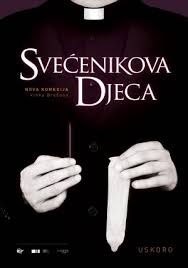
THE PRIEST’S CHILDREN
Croatia/Serbia, 2013, 95 minutes, Colour.
Kresimir Mikik, Niksa Butijer.
Directed by Vinko Bresan.
The Priest’s Children is a co-production from Croatia and Serbia. While the Serbian film industry has developed since the Balkan wars of the 1990s, less so in Croatia.
Croatia is a traditional Catholic country, with affiliations with Rome rather than with the Orthodox Church. This is very clear in this film with the church and its images, the priests and vestments, the rituals, the sacrament of confession.
The film was very popular in Croatia, much to the surprise of many people. Whether it was the seriousness or the humour, or a combination of both, it is hard to gauge from outside the country.
The film is comical and sometimes farcical in its episodes and to depiction of characters. It is also serious about sexual issues, about the decline in population in Croatia, about the need for a bigger population. It also observes the behaviour of the clergy, pastoral behaviour, comic behaviour and some disedifying episodes.
The film opens with Father Fabian in a hospital ward with many infants in cots. Then he is alone until a very young priest comes to talk with him, ultimately hearing his confession since he has a terminal tumour. The action is in flashbacks, showing his inability to connect pastorally with the congregation, in contrast with the elderly priest, Father Jakov, who is immensely popular, in sports with the elderly, in conducting choirs, in arranging tours to the Vatican, and having a huge line at his confessional. Fabian hears the confession of the newsagent, Petar, who is concerned whether his selling condoms is a mortal sin and what he should do about it. The solution for them both is to pierce the condoms and see what happens, thus avoiding selling contraceptives and people then not having sex with contraception.
The island blooms with tourists all hearing about fertility on the island and they come in order to promote their own fertility. Meanwhile, there are some problems on the island, a young woman giving birth with three possible fathers and a baby left at the presbytery door.
The church action involves a visit from the Bishop who takes a rather permissive stand about the condoms. And Father Jakov is exposed as having double standards even though it seems he is going to be promoted to be a Bishop. There is a reference to Catholic morality, references to both John Paul II and Benedict XVI.
For those from other parts of the world, the film is interesting in seeing how it handles its situation, attitudes towards the church and clergy, sexual morality.
1. A film, both serious and comic? observation on Croatian life and customs? On the church? Satire? More serious reflection on 21st century situations, especially after the wars of the 1990s and the Croatians’ experience of the Serbs?
2. Croatia in the 1990s, the wars, religious tensions, the suffering of the people? In the history of the Balkan Peninsula from World War II onwards?
3. The island locations, the village, the church, homes? Atmosphere? The musical score and its tone?
4. The title, audience expectations? Clergy, morality, sexual issues? The church? Bishop and priests? References to the Pope and the Church’s teaching?
5. The satiric tone, farcical aspects of the film, plot of characters, issues?
6. The Catholic traditions in Croatia, the Roman rite? Visualising the church, the sacred images, rituals, vestments? The clergy and pastoral care? Administration of the sacraments, especially confession? Sexual morality, the issues of contraception, pregnancy and conception, abortion?
7. The opening, Father Fabian, his nightmare, in the ward with all the babies, finding himself alone, his tumour, his appearance? The very young visiting priest? Fabian going to confession, the flashbacks and his story?
8. Fabian’s reputation, his narration, assisting Father Jakov, Jakov’s popularity with the people, church, sports, the choir, the lineup at his confessional and none at Fabian’s? Petar and his confession, pushing in, the man dying outside the confessional? His story, the condoms, the effect on Fabian? The plans?
9. The situation of the condoms, the newsagent selling them, Fabian examining them, the decision to pierce them? Marta and her finding the condom, her
attack on Fabian, reporting him to the Bishop, hearing this during the funeral, Petar and Fabian running to the wharf, the boat leaving?
10. Petar and Marta, not have any children? Petar as the newsagent, the range of customers, the collage of customers at his window? The statistics? The information? The issue of Croatia and its population, decreasing, the need for more children?
11. The young girl, her baby, the three candidates for paternity, the film developing each of their characters? The confrontation with Fabian, going to the DNA tests? Fabian and Petar the choice of a father? The wedding ceremony? Later the father and his being on the roof, demented?
12. The baby at the door, Petar taking it, Marta pretending she was pregnant?
13. The effect on Fabian, the reputation of the island, the press, the tourists all coming in order to get pregnant? The islanders making money?
14. The funeral sequences, the farcical touches?
15. The Bishop of writing, listening to Fabian’s explanation, laughing? His ambiguous sexual morality?
16. Jakov, the choir, going to the Vatican, the group, being filmed, bringing the book back for Fabian?
17. Anna, her mental state, that she had given birth to the baby and left it? Jakov being the father? His double standards?
18. Jakov and his going to Fabian for confession?
19. The end for Fabian, his tumour?
20. The young priest, his deciding that he should go to confession…?
21. The film’s attitude towards sexual morality, towards the church’s teaching, towards double standards with the clergy? Relevant to Croatian society? Its impact worldwide?